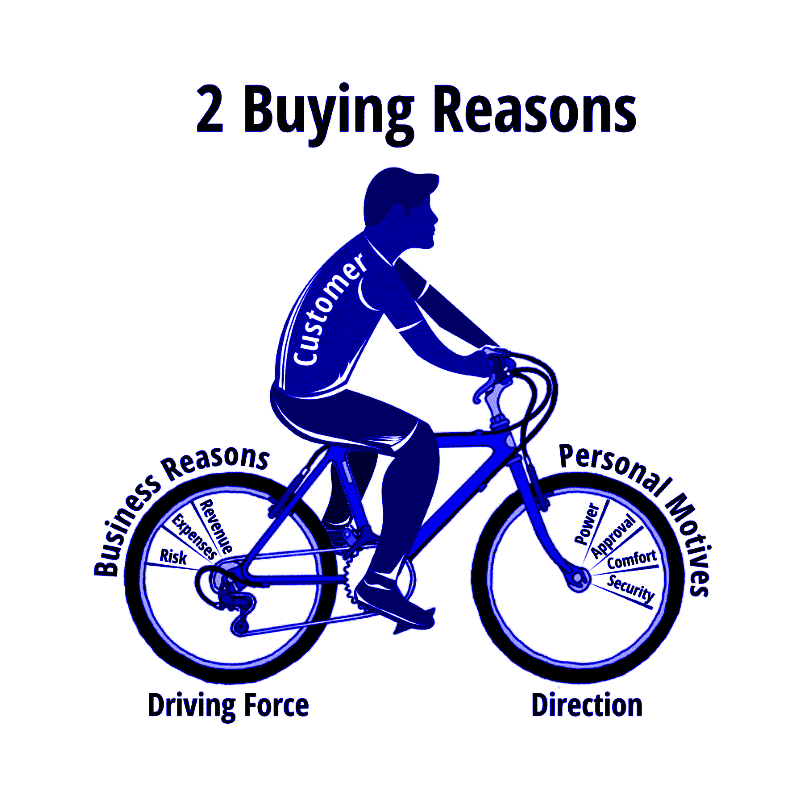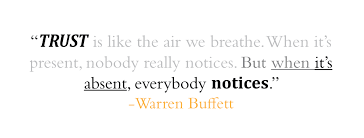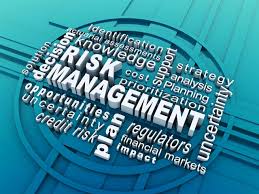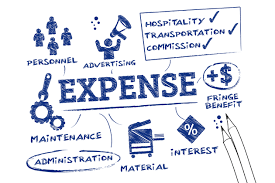If the rear wheel of your customer’s bike is the driving force, or the business reasons, behind why your customer buys (as we discussed in Part 1), then the front wheel is the one that determines the direction in which he will go – whether he buys from you or from someone else. Here, personal motives are the deciding factor.
Topics: sales process, Sales, sales strategy
There are two forces that drive a customer’s buying decision: business reasons and personal motives. A successful sale depends on your ability to accurately identify the reason your customer has for buying and what he’s looking for in a vendor. If you fall short in either area, you are likely to lose the sale.
Topics: sales process, Sales, sales strategy
According to a 2015 Salesforce.com study, 82% of sellers are out of sync with their customers. In my experience, the most probable cause of this is that there are a lot of salespeople who are using outdated sales techniques based on an approach to selling that does not work in today’s environment.
Topics: Sales
Trust
Steven M Covey in the book The Speed of Trust states that companies that have high trust outperform low trust companies by as much as 286%. To get that level of performance, the employees are fully engaged. What does trust have to do with engagement? Everything! Trust is the foundation from which everyone builds relationships.
According to Harvard psychologist Amy Cuddy, the first things people subconsciously think during first impressions are: 1) Can I trust you? 2) Can I respect you? Trust is the beginning and the mortar of a relationship. Warren Buffett comments that it can take 20 years to build trust, but trust can be lost in 5 minutes through an untrustworthy act.
Trust is the foundation from which all relationships are built. People are not judging you on your competence first; they want to trust and respect you first, then they are open to learn about your competence. Trust is personal first. Then trust can be on the competence level, i.e. Are you competent in what you do?
Topics: Sales, employee engagement, motivation, productivity
It's Christmas Season - Why Bother will all the rush?
This blog is based upon a blog I wrote several years ago on Why bother with Christmas. It is worth reading again.
Last night we watched the Grinch That Stole Christmas which is one of my favorite Christmas stories. The Grinch hated Christmas for he thought it was all commercial and no real meaning. Do you have that perspective related to Christmas? Do you have the perspective with life in general, that there is not a real meaning?
Well, when the Grinch stole Christmas and Christmas still came, he knew that Christmas was "so much more than what can be bought in a store". His heart grew three times as big and he saved the slay, returned the toys and even "got to carve the roast beast." The Grinch had found purpose.
Too many times we lose perspective because we have lost purpose. Simon Sinek in his famous TED talk says that you must begin what you do with a purpose or begin with "Why?", not "What or How". Beginning with "Why" gives you purpose.
If you are engaged in sales and your "Why" is just to make another dollar, then you will lose your mojo in winning customers over. They will begin to sense that your drive is all about you and not about them. Without a true purpose in Christmas, the holiday becomes trivial, "noise, noise, noise" as the Grinch said. Without purpose of wanting to help your customers be better, your sales efforts become self-centered and lose purpose.
Topics: Sales, sales strategy, business legal issues
Revenue, Expenses and Risk
In all business purchases, there are 3 main business drivers that business owners and managers have as their core. The last 2 blogs I dealt with revenue and expenses. This one is on risk. There are two types of risk - general business risk and risk in the buying decision. General business decision risk is related to running the business. Buying decision risk is related to "Am I making the right decision and what will it cost me if I am wrong?" Both relate to business, but the buying decision risk has a lot more emotional factors involved, such as fear and ego.
Managing or reducing risk is huge factor in a buying decision. A business leader deals with risk in many areas. Risk to: data, people, buildings, general liability, financial, and business continuity to name a few. There are many ways managers try to reduce risk from insurance policies, data backups and cloud computing, physical security using ID badges, to having multiple people engage in the buying process. A buying committee is used to reduce risk, not necessarily get the best option with the most features.
I have a client who sells data services to banks. He reports that over the last seven years the focus has shifted from what revenue new software can deliver then to expenses reduction and now, the biggest concern is risk. The banks are evaluating contract terms, reputation of company, costs to get out of a contract and even data center uptime. To reduce vendor risk, flexibility in contracts is becoming a big issue.
Topics: sales training, Sales, effective questions
Selling to Core Issues - Controlling or Reducing Expenses
In sales, you must understand what the core drivers are for a business owner when he or she is making a business decision, especially about buying your product or service. In the business owner's mind, they are relating everything they evaluate to three key core business drivers: revenue, expenses and risk. They are asking these fundamental questions when looking at an offering:
1) Does this offering protect or increase my revenue? 2) Does this offering control or reduce my expenses? and 3) Does this offering reduce or control my risk?
As a sales rep, understanding those core issues and tying your offering into how they impact those areas, will greatly set you apart from other sales reps who are just selling features and benefits and making promises. The way to tie your offering into those areas is to ask lots of questions such as "Mr. Business owner, how do you see our offering impacting your revenue stream?" or "Others have seen a 10% reduction in expenses by implementing these new processes; do you see yourself getting a similar benefit? " "One of the key focuses of our software is to reduce the chance of a customer falling through the cracks and you losing the business or having a liability charge for negligence in serving your customer. Share with me how you see our offering impacting your business in this way."
Last week I focused on revenue. This blog will expound upon controlling or reducing expenses as the major buying criteria.
Topics: sales process, sales training, Sales
What matters most to a business owner - Revenue, Expenses and Risk
Topics: Sales, executive sales training, sales strategy
Salesforce.com released interesting data on the quality of leads and how fast they convert to deals. The data shows that leads coming from referrals have the shortest sales cycle and the highest percentage to close. Social media referrals/leads came in 2nd. Surprisingly, leads coming from tradeshow events and marketing and advertising were low on the scale in terms of converting to actual clients.
The reason being a referral and social media work so well is that the relationship begins on Trust. A cold call, website, or even tradeshow lead does not begin on Trust. Trust must first be established before the customer is willing to truly engage.
Topics: sales training, Sales, trust, handling objections










